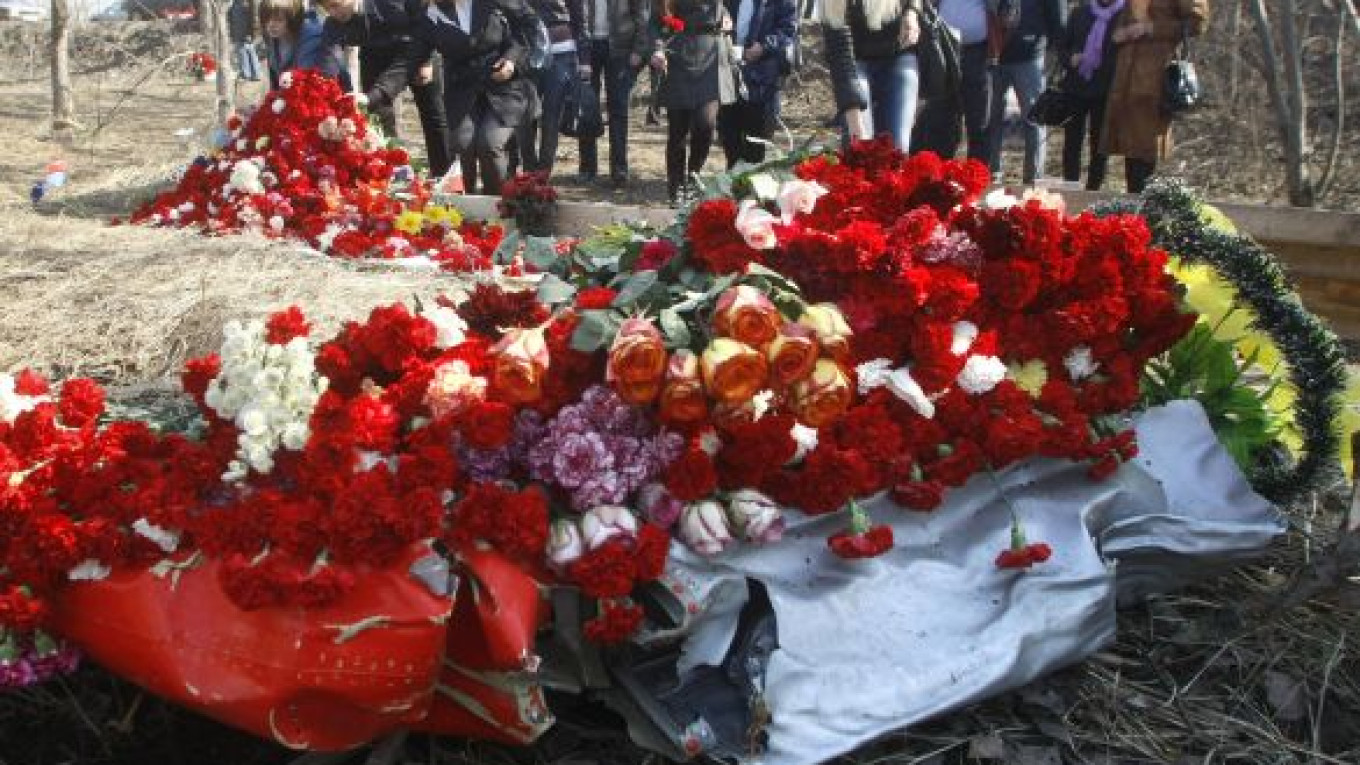Crash investigators said Monday that pilot error was likely to blame for the Tu-154 crash that killed Polish President Lech Kaczynski and dozens of senior Polish officials.
The Soviet-built jet crashed in thick fog in the Smolensk region on Saturday morning after its four pilots ignored advice fr om air traffic controllers to divert to an alternative airport.
Kaczynski was leading an 88-member delegation to commemorations to mark the 70th anniversary of the massacre of thousands of Polish officers by Stalin's secret police in the Katyn forest. A diversion to another airport would have delayed the ceremony.
All 96 people on the plane died.
Deputy Prime Minister Sergei Ivanov said the flight recorders were discovered in good condition and showed that air traffic controllers at the Severny Airport, where the plane was to land, had relayed their concerns to the pilots.
"It is reliably confirmed that the warning of the unfavorable weather conditions at the Severny Airport and recommendations to go to a reserve airport were not only transmitted but received by the crew of the plane," Ivanov said at a Cabinet meeting attended by Prime Minister Vladimir Putin, who is heading the crash investigation.
Investigative Committee chief Alexander Bastrykin earlier said the flight recorders showed no technical problems with the plane. "The readings confirm that there were no problems with the plane, and that the pilot was informed about the difficult weather conditions but nevertheless decided to land," Bastrykin said Sunday.
In Warsaw, Polish Prosecutor General Andrzej Seremet said Polish investigators had talked to the flight controller and flight supervisor and "concluded that there were no conditions for landing."
Some media reports suggested that the pilots might have risked landing anyway because Kaczynski was known for having disagreements with pilots. Kaczynski argued with a pilot who refused to land in Tbilisi because of dangerous conditions during the Russian-Georgian conflict in August 2008. Kaczynski threatened to punish the pilot after the plane landed in Azerbaijan instead, Rossiiskaya Gazeta reported at the time.
Seremet said Monday that there was no evidence to suggest that the pilots had been pressured to land on Saturday.
A former chief pilot for Poland's presidential jet, Tomasz Pietrzak, told Polish television that no pilot hired to fly the president would go against his better judgment on anyone else's orders. "The pilots are trained to give a sensible estimate of the situation," Pietrzak said.
Bulgarian media reported that the Tu-154 used by Bulgaria's president has been grounded pending the outcome of the Smolensk investigation.
Meanwhile, Russia observed a national day of mourning on Monday, with television channels canceling entertainment shows and commercials. Public celebrations also were canceled. April 12 is traditionally celebrated as the anniversary of Yury Gagarin's feat of becoming the first person in space in 1961.
President Dmitry Medvedev visited the Polish Embassy, wh ere he laid flowers at a portrait of Kaczynski and his wife and signed a book of condolences.
Kaczynski's body was returned to Warsaw on Sunday, while the other bodies were brought to Moscow for identification. The Polish president's wife, Maria Kaczynski, was identified Monday and was expected to be sent home as early as Tuesday.
About 160 people have come to Moscow from Poland, many of them relatives of the crash victims, to assist in the identification of the remains.
Health and Social Development Minister Tatyana Golikova said in televised remarks that 24 bodies had been identified.
Polish Foreign Minister Radoslav Sikorski "expressed deep gratitude for the comprehensive help and attention from the Russian authorities" during a phone conversation with Foreign Minister Sergei Lavrov late Sunday, the Russian Foreign Ministry said in a statement Monday.
On Sunday evening, Rossia One state television pre-empted its scheduled programming to show Polish director Andrzej Wajda's Oscar-nominated film "Katyn" about the World War II-era massacre. The film was shown in early April on the less popular Rossia Kultura channel in what observers called a government attempt to repair ties with Poland.
A Message from The Moscow Times:
Dear readers,
We are facing unprecedented challenges. Russia's Prosecutor General's Office has designated The Moscow Times as an "undesirable" organization, criminalizing our work and putting our staff at risk of prosecution. This follows our earlier unjust labeling as a "foreign agent."
These actions are direct attempts to silence independent journalism in Russia. The authorities claim our work "discredits the decisions of the Russian leadership." We see things differently: we strive to provide accurate, unbiased reporting on Russia.
We, the journalists of The Moscow Times, refuse to be silenced. But to continue our work, we need your help.
Your support, no matter how small, makes a world of difference. If you can, please support us monthly starting from just $2. It's quick to set up, and every contribution makes a significant impact.
By supporting The Moscow Times, you're defending open, independent journalism in the face of repression. Thank you for standing with us.
Remind me later.


